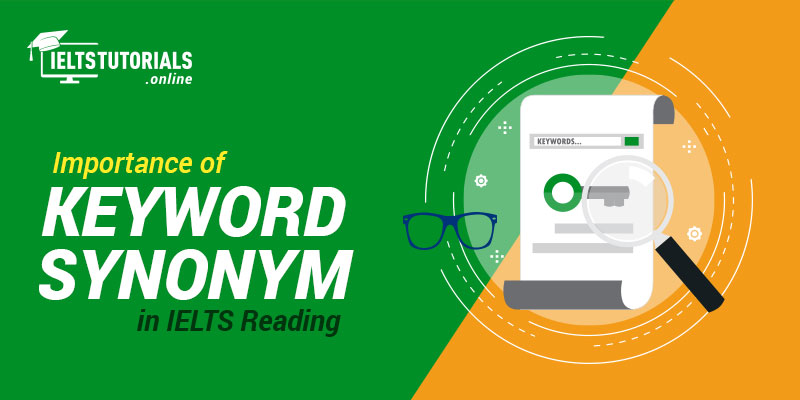
IELTS Reading: Significance of Finding Keywords & Synonyms
Aspirants often find the IELTS Reading module the most challenging in the IELTS Exam.
Why so?
Here are a few reasons!
- One of which, is that the IELTS Reading module requires immense concentration. As, in just 60 minutes, you need to read three long passages and answer 40 questions. Thus, reading the questions, understanding them and answering them correctly with the ticking clock is a challenging task.
In this blog, you will come across a few tips to improve your IELTS Reading score.
For now, stay put!
- Another reason is the difficulty level of the passages. For IELTS Academic Reading, the passages might be narrative, descriptive or argumentative. Sometimes, it may also include diagrams or graphs. Thus, the passages are lengthy! For IELTS General Reading, passages are taken from advertisements, notices, magazines, books and more. Thus, comprehending passages with different levels of difficulty and answering them correctly becomes a difficult task.
Why is the IELTS Reading test tough?
- You run short of time
- You are under pressure to answer each question correctly within the time
- You get confused with different words with similar meaning used by the examiner
- Unable to attempt a few of the question types because you have no time.
All these together make the
IELTS Reading module one of the hardest modules for most of the candidates.
So, what is the solution?
But, do you know how useful it is to know to identify the keywords?
What are Keywords in IELTS Reading?
Keywords are the words that carry specific information. Thus, the importance of Keywords in IELTS Reading will always exist in this module. These words will help a reader/candidate identify the context of the passage. In return, it helps find the correct answer.
Example: Check the following Passage
Brick by brick, six-year-old Alice is building a magical kingdom. Imagining fairy-tale turrets and fire-breathing dragons, wicked witches and gallant heroes, she’s creating an enchanting world. Although she isn’t aware of it, this fantasy is helping her take her first steps towards her capacity for creativity and so it will have important repercussions in her adult life.
Now, highlight the keywords as done above. Then get to the question:
Uses of children’s play
Building a ‘magical kingdom’ may help develop ....................
Now, try remembering the highlighted Keywords. "help develop’ and "help take first steps” mean the same thing. Thus, the answer is "creativity” – Magical kingdom may help develop "creativity”.
Which words can be your keywords?
Here is the list!
- Nouns and Verbs
- Names (places, scientists, people and more included in the passage)
- Locations (towns, cities, states, countries)
- Dates and Years
- Numbers or Figures
- Capitalized or Italicized words/phrases
In this post, we will share one sure shot technique that you can develop to ace your reading questions - match the information given in the question to the answer in the passage. This technique only works if you know the keyword synonyms.
What are Keyword Synonyms?
Keyword Synonyms are words that have the same or nearly a similar meaning as the keyword. They are often called parallel expressions.
For example,
Children ~ Kids
Speak ~ Talk
House ~ Home
Present ~ Gift
The above-listed words are not exactly the same in meaning, but they have similar meanings.
Let's have a look at an example of Sentence Completion.
**Source: https://www.ielts-simon.com/ielts-help-and-english-pr/2013/09/ielts-listening-multiple-choice.html
It is crucial that you develop the 'Keyword technique' to ace your IELTS Reading module with a high band score. For that, you can start your practice with free IELTS Reading practice tests.
Follow these simple steps while practising:
- Read the question
- Underline the keywords
- Brainstorm and take a mental note of keyword synonyms (as you will not have time to note down the synonyms for each keyword)
- Locate the keywords or keyword synonyms
- Skim and Scan the passage (If you have missed the Keywords or their synonyms).
- Write the answer
- Being able to do this means you can save time. And, that exactly is the key to success in IELTS Reading.
Quick Tips to follow
- You will not find identical words easily in the question and the passage. So, do not waste time finding the same words. Instead, look for synonyms.
- As you underline the keywords in the question, think of the synonyms for those keywords.
- Undoubtedly, having a good vocabulary is crucial to achieving a good score in IELTS Reading, but at the same time, you must know the synonyms of the words you learn. So, when you learn new words, pay attention to their synonyms too.
Continue to practice with the technique shared here. In the beginning, you may find it time-consuming and lengthy, but once you have practised it several times, you will be able to find your answers quickly and with better accuracy. This way, you will definitely improve your IELTS Reading score.